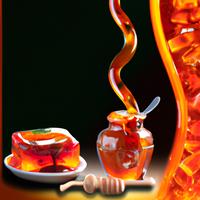
1 serving (30 grams) contains 100 calories, 0.0 grams of protein, 0.0 grams of fat, and 25.0 grams of carbohydrates.

Log this food in SnapCalorie

Nutrition Information
Calories |
787.4 | ||
|---|---|---|---|
% Daily Value* |
|||
| Total Fat | 0 g | 0% | |
| Saturated Fat | 0 g | 0% | |
| Polyunsaturated Fat | 0 g | ||
| Cholesterol | 0 mg | 0% | |
| Sodium | 236.2 mg | 10% | |
| Total Carbohydrates | 196.9 g | 71% | |
| Dietary Fiber | 0 g | 0% | |
| Sugars | 189.0 g | ||
| protein | 0 g | 0% | |
| Vitamin D | 0 mcg | 0% | |
| Calcium | 78.7 mg | 6% | |
| Iron | 0.8 mg | 4% | |
| Potassium | 157.5 mg | 3% | |
* Percent Daily Values are based on a 2,000 calorie diet. Your daily values may be higher or lower depending on your calorie needs.
Food Attributes
Source of Calories
About Karamel syrup
Karamel Syrup is a sweet and viscous topping made primarily from caramelized sugar and water, often enhanced with butter, cream, or natural flavorings. Originating from Western culinary traditions, it is a staple in desserts and beverages, adding a rich, indulgent touch to dishes like pancakes, waffles, ice cream, and coffee drinks. While beloved for its velvety texture and deep, toasted sweetness, Karamel Syrup is predominantly composed of sugar, making it high in calories and unsuitable for those seeking low-sugar options or managing blood sugar levels. It generally contains minimal nutrients and lacks dietary fiber, protein, or healthy fats. Some versions may include artificial additives or preservatives, but natural homemade variants can avoid these. Moderation is key in enjoying Karamel Syrup as part of a balanced diet, ensuring its decadent flavor enhances meals without compromising health.



